Humphrey Jennings
World War II Documentaries
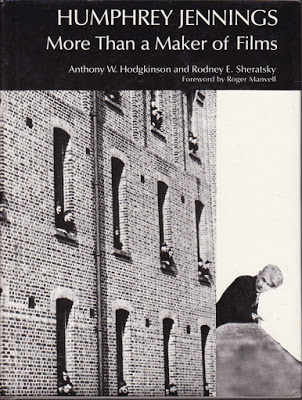
Director:
Humphrey Jennings
Year: Various
Rating: Various
A Diary for Timothy (1945) - 7.5
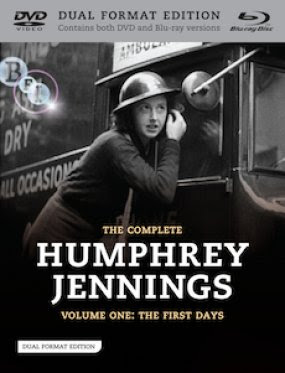
Humphrey Jennings was a British documentarian most famous for his series
of propaganda films that spanned WWII. He was not your typical rah-rah propagandist
that we are familiar with but was quiet, understated, lyrical and poignant
in his films. Lindsay Anderson said of him "the only real poet that British
cinema has yet produced." This is the first of his short films (38 minutes)
that I have seen and I gather that it is somewhat characteristic. His "propaganda"
primarily consists of what it was to be British in war time - people going
about their business of life as their loved ones fought the enemy overseas
and bombs fell from the skies. No overt courage is seen, no hatred for the
enemy is ever on display. Just being British is enough to say this is what
we are fighting for.
The narrative was written by the great English author E.M. Forster and spoken
by Michael Redgrave. At one point a bit of Hamlet is shown with John Gielgud
in the role. Otherwise though the film is full of ordinary people - a train
conductor, a miner, a farmer and a wounded RAF fighter who had been shot
down and is recovering in the hospital. The anchor for the film is the birth
of Timothy on September 3rd, 1944 - the fifth anniversary of the war. Redgrave
simply tells Timothy what has been going on and about the country he was
born to. The film follows his life for 6 months with the radio announcers
in the background keeping track of the war with Germany. It ends with the
Russians having crossed the border and with the American/English army crossing
the Rhine. Timothy the war is almost over, freedom has won and now it will
be your generation that has to make sure it never happens again.
Listen to Britain (1942) - 8.0
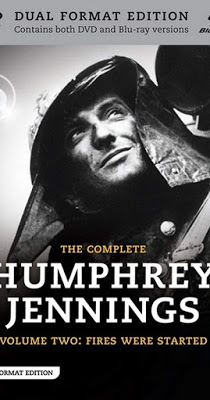
If you were to watch this short British documentary from 1942, you would
barely realize you were watching a propaganda film. That is the beauty of
it. That is the power of it. Humphrey Jennings creates a collage of sound
and images with no narration that simply says we are Britain. We are not
hiding. We are not cowering. The sound here is nearly a symphony - of dances
in a dance hall, the pounding of machinery, the clunk clunk of tanks moving,
children playing games, fields being harvested, a group of soldiers singing
Home on the Range, a lunchtime concert, factories cranking out weapons of
war. There are only occasional reminders that a war is going on. In a wheat
field five Spitfires fly high above, a photo of an absent husband in uniform
on the mantlepiece, tanks trudging through a small town, men walking down
the street with a metal hat in hand. You would barely know that Britain was
fighting for its life, but it was. 20 minutes and quite wonderful.
This is England (1941) - 7.5
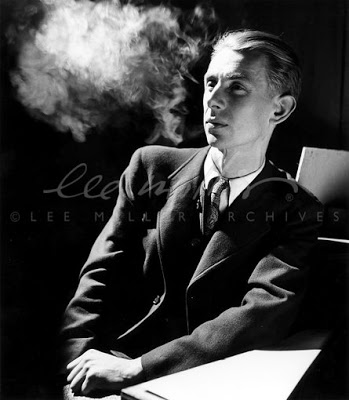
This is England. The fields, the steel mills, the factories, the people,
the spirit. This is a 10-minute propaganda documentary from Humphrey Jennings
and narrated by Edward R. Murrow during the most harrowing period of the
war as England stood alone against Hitler. Very simply done as Jennings shows
England at work and play. One powerful bit has an English symphony playing
Beethoven's Fifth as the camera pans a long stretch of buildings reduced
to rubbish by the bombs. What has happened to that Germany it seems to say.
But in factories all over the land they are preparing. Building planes and
tanks. Their time will come.
The Heart of Britain is the same film as this but with an English narrator
- making me think that the version with Murrow was for American consumption.
Words for Battle (1941) - 7.5
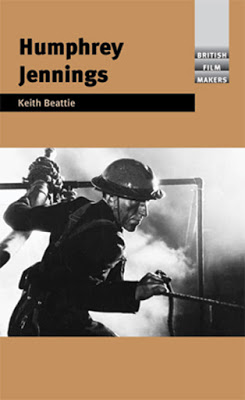
Humphrey Jennings was steeped in study and artistry with a father who was
an architect, a mother who was a painter and an education at Cambridge and
he was set for a career in academia before he became interested in film and
began directing documentary shorts in 1934. He was a founder of a group termed
the Mass Observation Movement which observed everyday life of every day people.
You can sense this in the titles of his early documentaries - Locomotives,
The Story of the Wheel, The Farm, English Harvest. This Movement was almost
an early version of social media as the Movement went directly to the people
to see what they had observed and thought about certain things and then published
them.
Words for Battle brings together Jennings aesthetics as it is a 7 minute
homage to England with Laurence Olivier narrating the poetry of Kipling,
Blake, Milton and others and ending the film with excerpts of Churchill's
We Will Fight Them on the Beaches speech and finally the Gettysburg Address
as England looked westward towards America to join them in their battle against
Fascism. It is a little more overtly propagandistic than his other films
that I have seen but is still lyrical, musical and aimed straight at the
English heart.
London Can Take It (1940) - 8.0
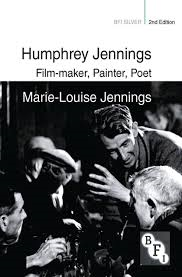
Eighty years after Humphrey Jennings made this 9 minute propaganda documentary,
it still has the power to move you, to hit you in the stomach. It helps to
have a bit of knowledge of history, to understand what London was going through
in 1940. Fighting for its life against the nightly bombardments as the rest
of the world remained neutral in a war that later would sweep the entire
globe in its destructive grasp. America in its isolation was still a year
away from entering. This is narrated by an American journalist Quentin Reynolds
in his dry understated tones - spelling out the horror as if it was a documentary
about a walk through a zoo. Some zoo. The night is coming on - the people
get ready for another night of hell - many go to the underground shelters
to spend the night; others get on their different uniforms to fight the fires
to come, to spot the planes, the blow the siren, to make sure there are no
lights - clerks, bankers, milkmen in the day, soldiers of a kind at night
- staying out in the night as the bombs fell. It has been like this for five
weeks; every night they come and are gone by dawn when a weary people once
again get dressed, go out to see whether their home is still standing, pick
up the milk bottle left on their step and then off to work. A beautiful piece
of work.
V-1 (1944) - 6.5
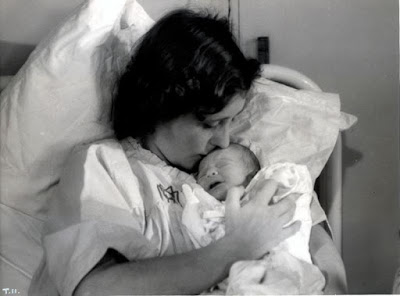
A short documentary from Humphrey Jennings about the German use of the V-1.
By 1944 the German Luftwaffe was unable to bomb England effectively as so
many planes and been lost and their ability to replace them and pilots was
greatly diminished. They also had to be used to defend Germany from the round
the clock Allied bombing. So they began producing the V-1 or as it was also
called the buzz bomb or the doodlebug and targeting London with these. They
were basically flying bombs on auto-pilot. They didn't have great range and
so the sites were set up on the coast of Europe. They began bombing soon
after D-Day until October of 1944. 80 days. They destroyed some 25,000 buildings
and thousands of lives. But the British stopped most of them with a combination
of barrage balloons, aircraft and anti-aircraft. The film shows these people
at work and the firing at the V-1s as they fly overhead and also shows people
down below going about their lives as they look up into the sky. And the
destruction. By October the Allied army had overrun all the V-1 sites and
brought it to an end.
In 1950 Jennings was in Greece doing some location scouting when he fell
off a cliff and was killed. His documentaries had been stored away and generally
forgotten as the decades passed, but a three disc set of his films have been
collected and released on DVD and Blue Ray has brought his name to the public
again. I have always enjoyed movies that dealt with the home front at war
- Mrs. Miniver for example - but this is the real thing and I quite enjoyed
them One film I have not seen is his Fires Were Started in which he follows
a unit that fights the fires caused by the bombing and is supposed to be
brilliant. And just to note that Timothy from A Diary for Timothy died in
2000. When he was younger he apparently became a Mod!







